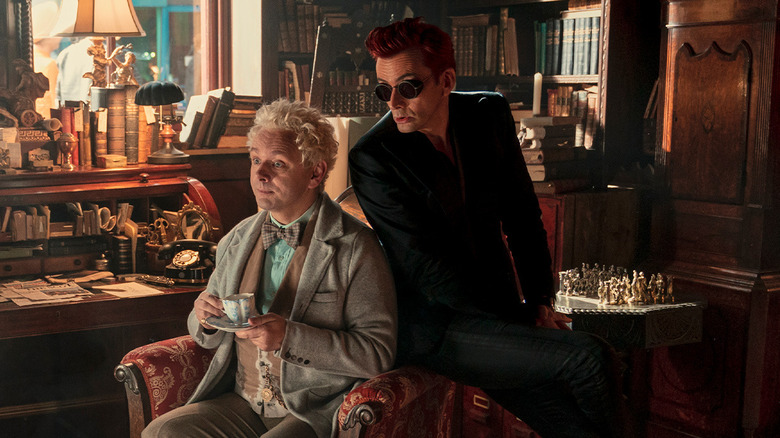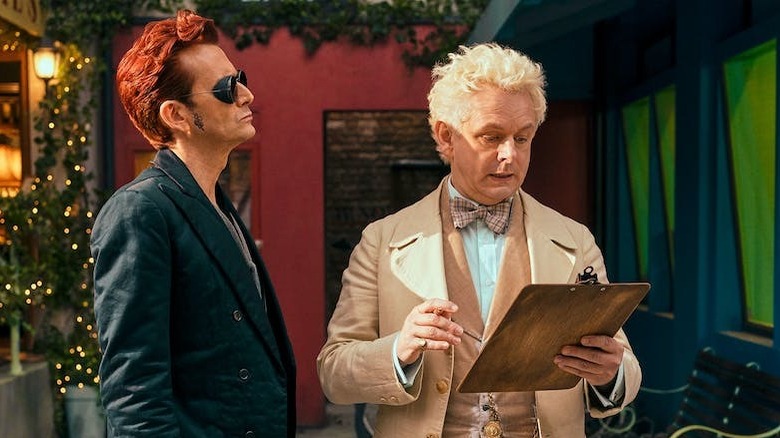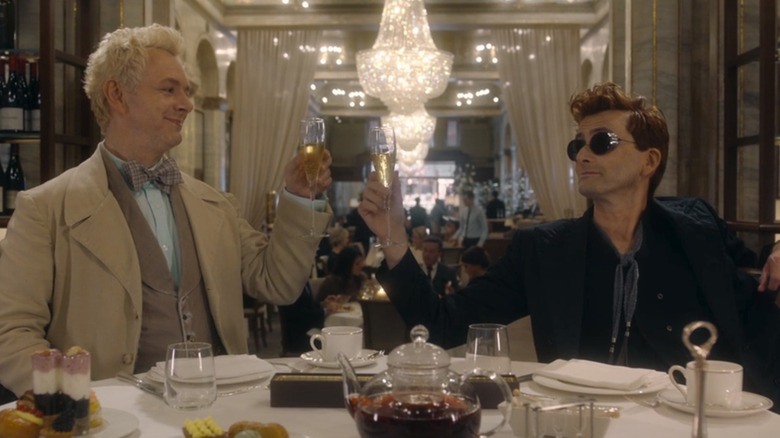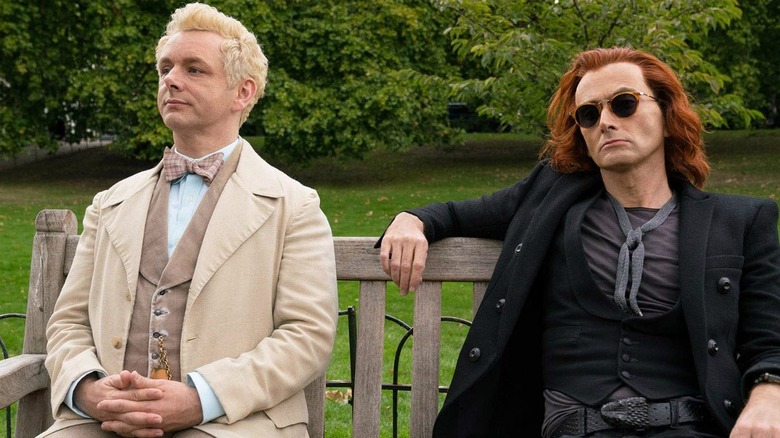Good Omens Season 2's Heartbreaking Musical Moment Needs A Deep Dive
This post contains spoilers for "Good Omens" season 2.
For six millennia, Aziraphale (Michael Sheen) and Crowley (David Tennant) have been in a slow-burn romance. Despite never uttering "I love you" aloud, it's a dance they both know well throughout the eons of the Prime Video-BBC apocalyptic comedy "Good Omens," based on the 1990 novel by Neil Gaiman (showrunner and writer) and the late Terry Pratchett. In perhaps the great celestial opposites-attract rom-com, Aziraphale is a cheerful do-gooding angel just as the fallen angel Crowley is a mischievous abrasive demon. They might pretend to be mortal enemies, but they take pleasure in collaborating and chattering on Earth. As seen in season 2, they often work to rescue mortals (like rescuing Job's children) or indulge in mortal antics.
After the season 1 finale, their excommunication from their respective offices seems to liberate them from their obligations. These Ineffable Boyfriends, though, get their relationship tested in the "Good Omens" season 2 finale. The Metatron (Derek Jacobi), an emissary of God (Frances McDormand), gives Aziraphale an offer he can't refuse: Take Gabriel's position of Supreme Archangel in Heaven. Eager to make a difference, a joyous Aziraphale accepts the call, along with the bonus of reinstating Crowley's angelic status. But Crowley, sick of the bureaucratic pretensions and Earth-shattering mission of both Hell and Heaven, balks at this. After enduring Heaven's corrupted bureaucracy, how can Aziraphale foolishly revert to this side? A lover's quarrel ensues. Much to Aziraphale's confusion, Crowley reports, "Do you hear that? ... No nightingales." Before Crowley storms out of the bookshop, the demon gives Aziraphale a much-hyped kiss (a kiss that would send ripples of fans screaming, both in delight at what has finally happened and for the terror of the incoming heartbreak). Aziraphale's stupor suggests that Crowley has never resorted to this act of mortal affection, and he's too stunned to contemplate Crowley's reference to the nightingale.
When a nightingale sang for two angels
Crowley mentioning the absence of nightingales sounds odd until you recall it's an allusion to the love song that accompanied their happily-ever-after dinner at the London Ritz Hotel in the season 1 finale. Over their communal mirth, God narrates, "While they were eating, for the first time ever, a nightingale actually did sing in Berkeley Square. Nobody heard it over the noise of the traffic. But it was there, right enough." To close this quaint scene, a musician plays the song "A Nightingale Sang in Berkeley Square." Both the novel and show essentially literalize its metaphorical lyrics, "There were angels dining at the Ritz." Being a rare bird in urbanized London, the songbird serves as a holy symbol for the earthliness and divinity of Aziraphale and Crowley's love. Even God appears to concede that the holiness of their bond transcends the powers of Heaven.
Tori Amos's soothing voice performed the cover that played in the season 1 finale and its end credits. Written in World War II-era 1939 by Eric Maschwitz (with music by Manning Sherwin), the love song is the perfect slow-dance love song that also homages the two angels' miracle-making during WWII (a season 1 incident that gets an extended storyline in season 2). The song's subject muses about the whimsy of their romance, so good to be true that the "whole darn world seemed upside down," which is a fitting metaphor for Aziraphale and Crowley defying the will of Heaven and Hell so that the pleasures of Earth can last longer.
Can you hear the magic?
But in season 2, God's narration is absent (the voice pops up as a brief cameo, with the two angels observing from the distance). It's a wise omission by writers Gaiman and John Finnemore, because it provides Crowley and Aziraphale the appropriate space alone in their own love story. Without a God talking over them, it's all the more meaningful when Crowley, a caustic demon, acknowledges the significance of the nightingale in their relationship. So during his break-up with Aziraphale, Crowley speaks in shorthand ("No nightingales") before he expresses his affection with the Big Kiss in a last-ditch attempt to rekindle that magic that danced around them at the Ritz.
However, The Kiss serves to isolate them further. A shocked Aziraphale bitterly spews, "I forgive you." A distraught Crowley watches as his angel soulmate takes the elevator to Heaven. This isn't the final shock for Aziraphale, either. He learns that he will help the Metatron and God orchestra the Second Coming, which means Earth will be shoved through another Heaven-ordained apocalypse. You don't need a God to know that this is the last scenario that a nightingale should sing for.
Will the nightingale sing again?
The lyrics take a bittersweet connotation when the two angels go their separate ways. The song's lovers exchange a "goodnight" after a kiss, implying that they are parting for the night and their date exists as a beautiful memory. The two angels also make their separate "homeward step" like the lovers in the song: A glum Crowley drives away on Earth as Aziraphale rises to Heaven with a quivering smile.
The final minute of season 2 leaves a melancholic mood when Crowley briefly plays the song in his Bentley, just enough for the title lyrics "a nightingale sang in Berkeley Square" to permeate the air. But then he switches it off before gas-pedaling off into the uncertain future. Crowley allows himself the bliss of a love song before snuffing it out, as if unable to swallow its bittersweetness for more than a few precious seconds. On the other hand, the song's truncation indicates that it may play again someday. Before Crowley drives off, he glances at the two lovestruck mortals, Maggie and Nina, who decided to put their romance on hold. Through the sight of their ordinary lives and practical separation, he understands that the nightingale is dormant for now. Life has no choice but to go on.
The finale end credits play not their love song, but a sad score (by composer David Arnold) as the audience observes the angels' pained expressions in their respective spaces. If season 3 comes with its Second Coming, a nightingale might sing another day for Aziraphale and Crowley. At least, if our prayers are answered.



